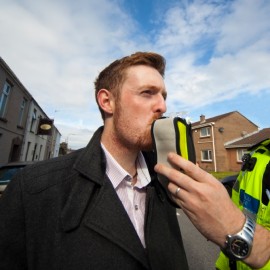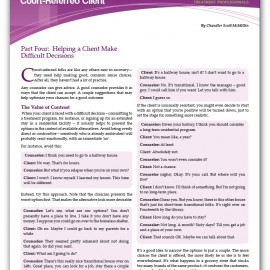Topic: criminal courts
DUI: Graduating Sanctions
A first offense can actually represent the product of a longstanding, well-established pattern of behavior.
Topics: consequences, criminal courts, DUI/DWI
Using Leverage in Counseling the Court-Referred Client, Part 6
A big fine, for instance, isn’t necessarily a better deterrent than a lesser one that is administered quickly and effectively.
Topics: client types and needs, compliance and noncompliance, counseling, court-mandated, criminal courts, DUI/DWI, establishing credibility, legal problems, leverage, relapse, Using Leverage Series
Using Leverage in Counseling the Court-Referred Client, Part 4
It’s not just what you present to your client — it’s how you present it. By following a few simple rules, you get better results. It’s not a perfect system, by any means. But it should improve outcomes.
Topics: client engagement and motivation, client types and needs, counseling, counseling skills, court-mandated, criminal courts, DUI/DWI, legal problems, leverage, resistance manipulation ambivalence, Using Leverage Series
Using Leverage in Counseling the Court-Referred Client
Having a judge or a parole officer holding the big stick on them may be enough to get them into treatment, but it’s usually not enough motivation to get them beyond the minimum of compliance.
Topics: addicted offenders, criminal courts, DUI/DWI, legal problems, leverage, treatment, Using Leverage Series
Deterring Drunk Driving: Thoughts on Designing a System
If estimates are correct that a typical offender has driven under the influence between 60 and 100 times prior to first arrest, it’s clear the actual problem is far, far greater than arrests alone can document.
Topics: criminal courts, DUI/DWI, legal problems, policy
Deterring Drunk Driving: The Role of Treatment
It seems to me that a successful approach to DWI must be based on the assumption that drunk drivers are a diverse population.
Topics: criminal courts, DUI/DWI, legal problems
Deterring Drunk Driving: Do Sanctions Work?
One state estimates around a fifth of offenders are rearrested within three years of the prior conviction. Expand that window to five or ten years and the rate is likely substantially higher.
Topics: criminal courts, DUI/DWI, legal problems, research
Tragic and Costly: DUI/DWI
Public perceptions of how we should and shouldn’t treat offenders often result in less than optimal solutions both for the addict/alcoholic and for the victims and the larger society that must pay.
Topics: criminal courts, DUI/DWI, legal problems
Counselors vs Probation Officers
If the clinicians view the PO as an outsider with the potential to interfere with treatment, there will be inevitable conflict.
Topics: addicted offenders, clinical management, criminal courts














